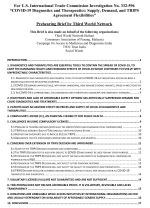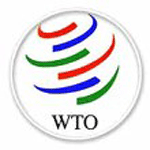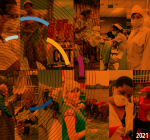Other news
Published on Wed, 2023-03-22 16:23
This brief discusses the important role of diagnostics and therapeutics in dealing with COVID-19 which in the near future will remain unpredictable and a threat to public health. It highlights global health experts persistently pointing to the inability of developing countries to effectively respond to COVID-19 due to lack of timely access to affordable diagnostics and therapeutics as the patent holding pharmaceutical industry prioritize higher-priced sales to developed countries. It stresses that high prices and lack of readily available affordable generic supply has artificially suppressed demand for COVID diagnostics and therapeutics. The brief elaborates on the effect of patents on access and the critical role of compulsory license and the TRIPS Decision in facilitating affordable access, and the challenges and opportunities in use of that very essential flexibility. |
Published on Sat, 2023-03-04 00:00
The LDC5 Conference was held in two parts. Part 1 adopted the new Doha Programme of Action for the Least Developed Countries for the Decade 2022-2031 (DPoA) on 17 March 2022 at the UN headquarters in New York. Part 2, the main Conference was held in Doha, Qatar, from 5 to 9 March 2023. The Civil Society Forum was organized by a Core Group of civil society organizations composed of LDC-Watch, Third World Network, Social Watch and Global Policy Forum, in collaboration with the United Nations Office of the High Representative for the Least Developed Countries (UN-OHRLLS). The Civil Society Forum was held in Doha, Qatar, from 4 to 9 March 2023. |
Published on Thu, 2022-03-24 15:09
The new generation Doha Programme of Action for the Least Developed Countries for the Decade 2022-2031 (DPoA) was adopted by the first part of the Fifth United Nations Conference on the Least Developed Countries (LDC5) on 17 March, at the UN headquarters in New York. The adoption of the DPoA was overdue as the LDC5 Conference, scheduled to take place in January 2022 in Doha, Qatar, was postponed due to the ongoing COVID-19 pandemic. |
Published on Mon, 2022-01-24 00:00
China has said that it steadfastly supports the least-developed countries (LDCs) during their accession to the World Trade Organization as well as their integration into the global trading system, suggesting that the LDCs are facing several problems in their bid to join the rules-based, member-driven, inter-governmental organization. At a virtual "tenth China Round Table on WTO accessions" held at the WTO on 18-20 January highlighting the key achievements of "China's Least Developed Countries (LDCs) and Accessions Programme" (the China Programme), China elaborated on the specific problems and difficulties being encountered by the LDCs during their WTO accession process. |
Published on Tue, 2021-12-14 00:00
Negotiations are advancing swiftly to conclude the draft "Doha Programme of Action for Least Developed Countries", which has evolved into a strikingly weakened outcome document, said sources familiar with the development. The draft Doha Programme of Action (DPOA) for the decade 2022-2031 will be adopted by the upcoming Fifth United Nations Conference on the Least Developed Countries (LDC5), scheduled for 23-27 January 2022 in Doha, Qatar, at the Heads of State/Government level. |
Published on Tue, 2021-07-13 00:00
Compiled under the challenging conditions resulting from the COVID-19 crisis, this edition of the Trade Union Take on the SDGs analyses and compiles the monitoring of the implementation of the Sustainable Development Goals (SDGs) at national level undertaken by 22 labour organisations in 13 countries and four continents. |
Published on Wed, 2020-12-02 00:00
The COVID-19 pandemic has resulted in the Least Developed Countries (LDCs) this year experiencing their worst economic performance in 30 years, the United Nations Conference on Trade and Development (UNCTAD) has said. In its Least Developed Countries Report 2020, released on 3 December, UNCTAD said that while the pandemic had (at least initially) a less-than-catastrophic health impact on the LDCs, its economic repercussions have been ruinous. In 2020, the COVID-19 pandemic led to LDC economies experiencing their strongest economic shock in several decades. |
Published on Wed, 2020-11-18 14:27
The Least Developed Countries (LDCs) have been hit hard by the decline in world trade triggered by the COVID-19 pandemic, with the value of LDC merchandise exports falling by 16% during the first half of 2020, the World Trade Organization has said. In a report to a meeting of the WTO Sub-Committee on LDCs last week (WT/COMTD/LDC/W/68), the WTO Secretariat said that data from 97 economies, which include most of LDCs' key trading partners, show that the value of LDC merchandise exports dropped by 21% during March-June 2020 year-on-year. |
Published on Thu, 2020-10-15 13:33
Nearly 380 civil society organizations have urged Members of the World Trade Organization to strongly support the adoption of a draft decision proposed by India and South Africa for a waiver from certain provisions of the TRIPS Agreement to combat the worsening COVID-19 pandemic. India and South Africa have submitted a proposal (IP/C/W/669) to the WTO TRIPS Council on a "Waiver from certain provisions of the TRIPS Agreement for the prevention, containment and treatment of COVID-19". |
Published on Wed, 2020-08-12 00:00
Over 70 per cent of young people who were either studying or combining study and work before the onset of the COVID-19 pandemic experienced school closures, and not all were able to transition into online and distance learning, the International Labour Organization (ILO) has said. According to a report on youth and COVID-19, the ILO said that COVID-19 has left one in eight young people (13 per cent) without any access to courses, teaching or training. |
SUSCRIBE TO OUR NEWSLETTER










